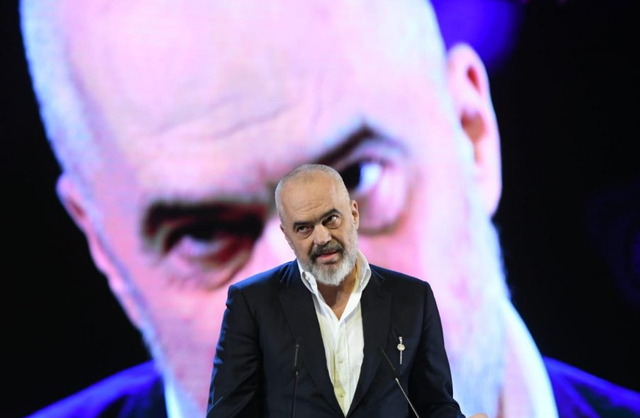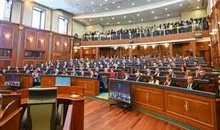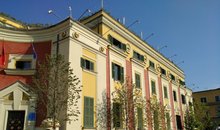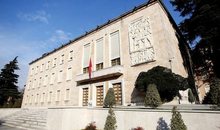
 Flash News
Flash News
American media: If Rama wins, these will be the last elections. Albania is moving from democracy to dictatorship

On May 11, 2025, Albanians will head to the polls to elect a new parliament. If Prime Minister Edi Rama, the leader of the Socialist Party of Albania, wins, these could be the last elections for the Balkan country, writes the American media 1945. What was once a model for post-communist transition is now teetering on the brink of dictatorship again. Interventions by the State Department and the United States Agency for International Development (USAID) have also transformed one of the most promising economies in the Balkans into a narco-state.
Albania's rise from communist dictatorship
Albania has long been a post-Cold War success story. During the Cold War rule of Enver Hoxha, Albania was as repressive as North Korea. However, after Hoxha's death and the collapse of the Soviet Union, Albania was reborn.
Its people rejected their state-imposed anti-Americanism and became some of the most enthusiastic supporters of the United States. Albania votes with the United States in the United Nations as much as Australia, and even more than former allies like the Netherlands, Spain, or Sweden.
Much of the credit for Albania’s transformation goes to Sali Berisha, a cardiologist who rose to prominence in the 1990s when he led calls for the Albanian Party of Labor to end its monopoly on power. He has repeatedly chided Hoxha’s successor, Ramiz Alia, for the superficiality of the reforms. Ultimately, Berisha founded the Democratic Party of Albania, an unabashedly center-right party. In Albania’s first free elections in 1991, Berisha won more than a third of the vote, despite Alia’s near-monopoly on the media and society. A year later, the Democratic Party took nearly 60 percent of the total vote, and Berisha became president.
It was a transformative time. Berisha privatized both land and housing. Within a few years, Albania's new private sector accounted for three-quarters of gross domestic product. He reduced inflation to single digits and allowed religion to flourish again after decades of communist repression.
Jo çdo gjë në mandatin e tij ishte pozitive. Shqiptarët humbën kursimet e jetës në skemat Ponzi në një kohë kur Partia Demokratike kishte pothuajse kontrollin total. Dhuna shpërtheu ndërsa shqiptarët fajësuan qeverinë. Kur çdo parti ka monopol, rritet edhe arroganca dhe ndjenja e mosndëshkimit. Megjithatë, shqiptarët e morën seriozisht demokracinë e tyre. Në vitin 1997 shqiptarët ndëshkuan Partinë Demokratike. Partia Socialiste fitoi më shumë se gjysmën e votave dhe Barisha kaloi me hijeshi në kryetar të opozitës. Barisha u kthye në pushtet si kryeministër tetë vjet më vonë dhe punoi ngushtë me Presidentin George W. Bush për të fituar pavarësinë e Kosovës. Ndërtimi i rrugëve dhe zhvillimet e tjera të infrastrukturës karakterizuan postin e tij të kryeministrit.
Tradhtia e Edi Ramës ndaj Demokracisë
Megjithatë, pas humbjes në vitin 2013, Berisha dha dorëheqjen nga udhëheqja e partisë, megjithëse ai mbeti një figurë me ndikim jashtëzakonisht të madh dhe kështu një objektiv politik, pothuajse në të njëjtën mënyrë, ndoshta, si Ronald Reagan ose ndikimi i Barack Obamës u shtri shumë kohë pasi ata lanë detyrën. Dallimi mes Amerikës dhe Shqipërisë, natyrisht, është kur Regani dhe Obama mbaruan mandatin e dytë, madje edhe kundërshtarët e tyre politikë nuk u shqetësuan se do të ktheheshin.
Për Edi Ramën, kreun e Partisë Socialiste që u bë kryeministër në vitin 2013, megjithatë, fantazma e Berishës u duk e madhe. Duke mos u kënaqur me rrahjen e Berishës në kutinë e votimit, ai iu përkushtua diskreditimit dhe skualifikimit të Berishës. Këtu, për fat të keq, Rama kishte një aleat tek Obama dhe shumë në Departamentin e Shtetit që nuk i besonin qendrës së djathtë. Rama zbuloi shpejt se çdo dispersion që ai bënte ndaj Berishës do të gjente besnikëri në Uashington. Sigurisht, korrupsioni shqiptar ishte real. Në vitin 2010, Shqipëria u rendit e 116-ta në Indeksin e Perceptimit të Korrupsionit të Transparency International. Më keq se çdo vend evropian përveç Bjellorusisë dhe Rusisë. Një dekadë më vonë, pas shtatë viteve të Ramës, Shqipëria shënoi vetëm pak më mirë, duke u renditur në vendin e 104-të, por duke kaluar pas Bosnjës, Kosovës dhe Maqedonisë së Veriut.
Departamenti i Shtetit gjunjëzoi Demokracinë Shqiptare
Duke qenë se lufta kundër korrupsionit ishte një çështje madhore, administrata e Obamës dhe Agjencia Amerikane për Zhvillim Ndërkombëtar (USAID) mbështetën Strukturën Speciale kundër Korrupsionit dhe Krimit të Organizuar (SPAK). Ishte një ide e mirë, e ekzekutuar keq. Ashtu si Rexhep Tajip Erdogan mori në dorë zyrën e auditimit bankar për të mbyllur kundërshtarët e tij, po ashtu Rama e armatosi SPAK-un. Objektivi i tij kryesor? Berisha dhe mbështetësit e tij.
Enter Yuri Kim, a career diplomat who became U.S. ambassador to Albania in 2020; it was her first ambassadorial post. She embraced Rama, literally and figuratively, openly favoring Rama and belittling the Democratic Party and the opposition, famously telling Berisha to “eat grass.” Secretary of State Antony Blinken’s ideological hostility to the center-right, Kim’s partisanship, and USAID Administrator Samantha Power’s willingness to allow Rama to turn SPAK into a political weapon combined in a disastrous decision by the State Department to designate Berisha and his family persona non grata and revoke their visas to the United States. To appease Kim and the State Department, the Democratic Party expelled Berisha. It didn’t work. As Rama became more corrupt and the Democratic Party of Albania continued to lose elections, they again rallied around Berisha, who in 2022 resumed his role as opposition leader.
There are three parallels to what the State Department and the Obama and Biden administrations have done to Albania, all of which are now at the forefront. The first is Zimbabwe, where, for ideological reasons, the Carter administration embraced Robert Mugabe long after it became clear that his leftist rhetoric had less to do with social justice and more to do with consolidating dictatorship.
Latest news



2 high-risk individuals arrested in Dibër
2025-04-19 10:21:13

Dom Gjergj Meta wishes all Christians a happy Easter
2025-04-19 09:38:28
Abuse at Kapshtica Customs, 6 officials are being prosecuted
2025-04-19 09:20:11
Accident in Kicevo-Gostivar, 3 dead, 8 injured
2025-04-19 08:54:07
Foreign exchange/ How much foreign currencies are bought and sold today
2025-04-19 08:40:11
Horoscope, discover the star forecast for your sign
2025-04-19 08:21:14
Weather forecast for today, April 19, 2025
2025-04-19 08:07:18
Morning Post/ In 2 lines: What mattered yesterday in Albania
2025-04-19 07:54:58
The SP's electoral crime scheme with the Fier administration is proven
2025-04-18 22:57:15
Fevziu: Veliaj's arrest gave the left a 'friend' on the eve of the campaign
2025-04-18 22:42:43


Swearing-in of MPs in Kosovo uncertain even on Saturday
2025-04-18 21:56:16
Find out what are the most aggressive zodiac signs who can't hold their nerve?
2025-04-18 21:32:47
Berisha: Rakip Veliaj has set up the same scheme as 5D
2025-04-18 21:12:04

Iranian Foreign Minister seeks Russia's support in nuclear talks
2025-04-18 20:42:52







The speech that aims for the European passport, but not for drinking water
2025-04-18 18:58:15
33-year-old Albanian dies in Greek detention
2025-04-18 18:33:45

Zelensky accuses US envoy Witkoff of spreading Russian narratives
2025-04-18 18:08:33



Fight in Durrës cemetery, father and son injured
2025-04-18 16:58:31
Israeli strikes kill at least 17 people in Gaza
2025-04-18 16:29:04
A woman dies in an accident in Tapiza, the 33-year-old driver is in custody
2025-04-18 16:26:04


EU: It is essential for Kosovo to quickly form a new government
2025-04-18 15:53:40
Two Albanians sentenced to 18 years in prison for raping English woman
2025-04-18 15:44:34

How to prepare your skin for a perfect tan this summer?
2025-04-18 15:16:02
Dritan Rexhepi refuses to testify about the kidnapping of Jan Prenga
2025-04-18 14:59:18

Abuse of "SASPAC" funds/ GJKKO postpones hearing against Ilir Beqaj
2025-04-18 14:38:26
Meloni in Washington, Trump: We will have an agreement with the EU
2025-04-18 14:22:16





Piranha Investigation/We consumed milk with aflatoxin
2025-04-18 13:06:16
Letter to first-time voters!
2025-04-18 12:56:06


Berisha: A judge ordered SKAP to investigate Rama for the villa in Surrel
2025-04-18 12:20:51





BKH agents attacked, Fier court leaves Agron Kapllanaj's grandchildren in prison
2025-04-18 11:22:14
"Albania couldn't hold on", Lara Colturi chooses Italy for her career
2025-04-18 11:10:50
Rubio: We will withdraw from Russia-Ukraine peace deal if there is no progress
2025-04-18 10:58:18


Beyond the horizon, life goes on! Black Friday and Easter
2025-04-18 10:31:31

VIDEO/ Diaspora vote, Albanian shows the middle finger to the SP
2025-04-18 10:10:47
Ajola Xoxa appears before SPAK, implements the "compulsory appearance" measure
2025-04-18 09:58:34





Foreign exchange, April 18, 2025
2025-04-18 08:58:05
Germany needs construction workers
2025-04-18 08:55:05


Horoscope, what do the stars have in store for you today?
2025-04-18 08:23:30
Temperatures reach up to 24 degrees, weather forecast
2025-04-18 08:08:21
Posta e mëngjesit/ Me 2 rreshta: Çfarë pati rëndësi dje në Shqipëri
2025-04-18 07:52:20

Assassination in Tirana, police react: 4 injured in Trauma, two of them minors
2025-04-17 22:34:30
Gunfire in Tirana, 4 people injured
2025-04-17 22:16:15

Tirana Incinerator, Lala: Officials were punished as if they stole a chicken
2025-04-17 21:50:29
Wealth Zodiac: Who has the money magnet?
2025-04-17 21:47:18





Assassinations in Lezha Plain, Roan Brahimi's father is killed
2025-04-17 20:29:59

The first 600 ballots from the diaspora arrive in Albania
2025-04-17 19:52:59

Farmers who make BÉ-eee and farmers of the EU!
2025-04-17 19:30:47
